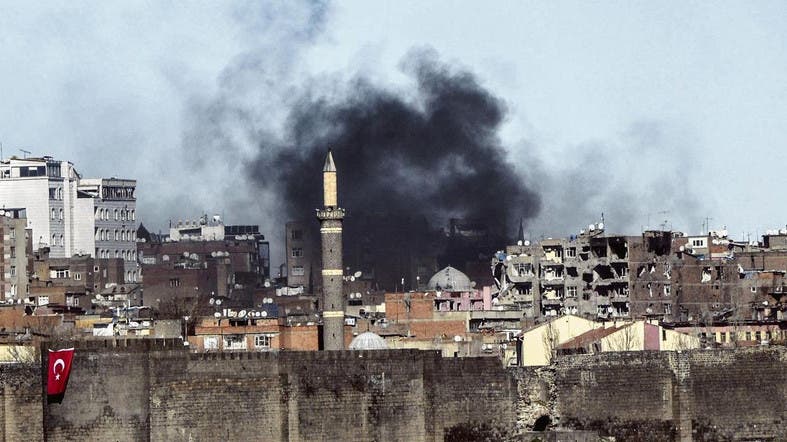
The bombing took place near Bursa’s 14th century Grand Mosque, a
historic symbol of the city that was the first capital of the Ottoman
empire before the conquest of Constantinople (File Photo: AFP)
AFP | Istanbul
Friday, 29 April 2016
A female suicide bomber who blew herself up in the centre of one of
Turkey’s most historic cities this week was linked to Kurdish militants
and had also fought in Syria against militants, a report said Friday.
There was no fingerprint evidence available from the remains of the woman who blew herself up in front of a mosque in the former Ottoman capital of Bursa on Wednesday but she has now been identified after DNA testing, the Hurriyet daily said.
The woman has been identified as Suzan B., who the report said is a member of the Kurdistan Workers Party (PKK) which has been fighting the Turkish security forces since a truce collapsed last summer.
It said she had also spent time in Syria fighting with the Kurdish Peoples’ Protection Units (YPG) militia against ISIS militants and had crossed back into Turkey in April.
This fits the narrative of the Turkish government that the YPG is the Syrian branch of the PKK, an assertion disputed by Washington which works with the Syrian Kurdish militia as allies in the fight against ISIS.
Hurriyet quoted its sources as saying the woman had fought against ISIS in the battle for the Syrian border town of Kobane which was won by the Kurdish militia last year.
The Turkish authorities have detained 15 people in the wake of the bombing, which created new jitters in the country after a wave of deadly attacks this year.
Thirteen people were wounded in the blast but no one else was killed, leading some commentators to conclude the bomber ignited her charge prematurely.
Those detained include two women whose identity cards the bomber had taken and one of her friends.
Hurriyet said the bomber’s identity was confirmed after DNA samples were taken from her family in the Mardin region of southeast Turkey.
Two attacks that killed dozens of people in the capital Ankara in February and March were claimed by a group calling itself the Kurdistan Freedom Falcons (TAK), a radical splinter group of the PKK.
Turkish Interior Minister Efkan Ala said on Thursday that the group behind the attack has been identified but the authorities have so far been tight-lipped on making the details public.
There was no fingerprint evidence available from the remains of the woman who blew herself up in front of a mosque in the former Ottoman capital of Bursa on Wednesday but she has now been identified after DNA testing, the Hurriyet daily said.
The woman has been identified as Suzan B., who the report said is a member of the Kurdistan Workers Party (PKK) which has been fighting the Turkish security forces since a truce collapsed last summer.
It said she had also spent time in Syria fighting with the Kurdish Peoples’ Protection Units (YPG) militia against ISIS militants and had crossed back into Turkey in April.
This fits the narrative of the Turkish government that the YPG is the Syrian branch of the PKK, an assertion disputed by Washington which works with the Syrian Kurdish militia as allies in the fight against ISIS.
Hurriyet quoted its sources as saying the woman had fought against ISIS in the battle for the Syrian border town of Kobane which was won by the Kurdish militia last year.
The Turkish authorities have detained 15 people in the wake of the bombing, which created new jitters in the country after a wave of deadly attacks this year.
Thirteen people were wounded in the blast but no one else was killed, leading some commentators to conclude the bomber ignited her charge prematurely.
Those detained include two women whose identity cards the bomber had taken and one of her friends.
Hurriyet said the bomber’s identity was confirmed after DNA samples were taken from her family in the Mardin region of southeast Turkey.
Two attacks that killed dozens of people in the capital Ankara in February and March were claimed by a group calling itself the Kurdistan Freedom Falcons (TAK), a radical splinter group of the PKK.
Turkish Interior Minister Efkan Ala said on Thursday that the group behind the attack has been identified but the authorities have so far been tight-lipped on making the details public.
No comments:
Post a Comment